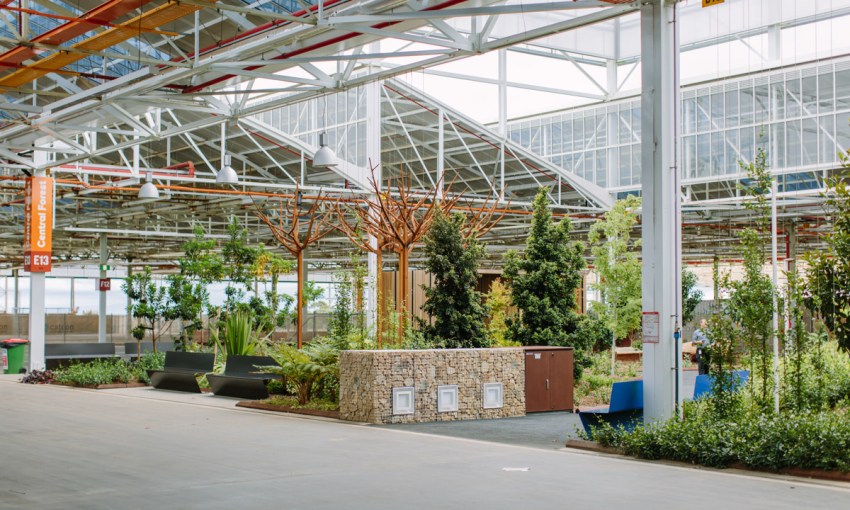Ahead of our Autumn Edition's long form investigation into the state of Australian universities, we're getting warmed up by exploring some of the biggest issues facing these institutions. First up - a new pressure to become the innovation factories Australia's economy needs.
The future of universities: Innovation factories
Australian universities are weathering near-constant attack.
The media carry stories about their falling standards, our institutions’ international rankings are on the slide, and debates about how to fund them are still recovering from the 2014 scandal of proposed fee deregulation.
CityMag’s long form investigation of the future of Australia’s universities will be published in our Autumn Edition on February 23.
The main image shows the garden at Tonsley, where the former Mitsubishi factory site has been converted into an industry hub and Flinders University’s New Venture Institute is based.
CityMag examines these issues, and how our universities can forge a path past them into a more successful future, in our Autumn Edition. But while we were researching the sector, we came across another burgeoning problem for it – an increasing pressure to become the engine room of Australia’s #ideasboom.
This pressure expresses itself in an increasing Government interest in funding university research that relates directly to industry outcomes.
“High quality research from all fields of knowledge makes a vital contribution to Australia’s wellbeing and global progress and is an important contributor to securing an innovative, prosperous and sustainable future for Australia,” Federal Education Minister Simon Birmingham told CityMag.
“However, the Turnbull Government has been steadily reforming research programs to better encourage collaboration between industry and universities so as to ensure our research dollars ultimately get the best possible outcomes for Australia. The reforms we’ve been delivering through the National Innovation and Science Agenda will ensure we help, not hold up, research that will help Australia.”
Many university players are optimistic about this change.

Flinders University Vice Chancellor Professor Colin Stirling
Flinders University Vice Chancellor Professor Colin Stirling was recently appointed Chair of policy group Innovative Research Universities, reflecting his and his university’s commitment to embracing the new direction.
“We’re doing many things with industry,” says Colin of Flinders University’s interest in the area. “We’re working with industry primarily at our Tonsley location where we have our New Venture Institute.
“The New Venture Institute (NVI) has – in the last two years, three years perhaps – has taken our own students and members of the public and helped them to develop up from an idea to a start-up company and we have, I think, in excess of nearly 150 start-up companies that have been established through that process.”
Bodies like the NVI are popping up at universities throughout the country, and many of them are having early success. However, there is a danger that an increased focus on industry-ready research could compromise some of the traditional roles of the university.
Dr Gwilym Croucher is a higher education researcher, analyst and policy adviser at the University of Melbourne, and he says focussing too heavily on obvious industry collaborations could actually diminish our universities’ ability to achieve true innovation.
“I think the first point is to recognise that universities are not organisations whose primary goal is to commercialise and make money. They’re just not set up like that,” he says.
“There’s definitely a role for commercialisation and it’s probably time to focus on that more because it’s something people have been trying for the last several decades in Australia and I don’t think we’ve got it right… But to think that it can fully supplant and take over the role of universities supporting basic research – that’s bound to fail in the long run.”
Basic research is university speak for the kind of research that examines fundamental phenomena – for example, by exploring further or challenging existing scientific norms, and it rarely has an immediate application. However, it’s this kind of research that often leads to technological revolution in the long-term.
“A good example would be something like the iPhone,” says Gwilym. “… there’s no single person in Apple that understands all the technologies involved. It’s just too complicated.
“And pretty well every one of those technologies was developed at some point with the support of publicly-funded basic research – it’s just the reality of it and the reality of most technological and other innovation.”

ICC Manager Jasmine Vreugdenburg
Jasmine Vreugdenburg is the manager of the Innovation and Collaboration Centre (ICC) at the University of South Australia. The ICC focusses on connecting industry with relevant expertise and research within the university, while also supporting start-ups and entrepreneurs.
“Basically you need to keep innovating to change and to keep up with what’s going on in society and I think that in terms of the role that the universities can play… it’s really quite important because you have academics that might be heavily focused on their area of research and they may not be looking outside at what the broader commercial applications could be,” says Jasmine.
“Some of our researcher are really good at it, but others need to do be supported through that translation process. It’s thinking about creating new economies and driving economic growth.”
But for Jasmine, the fact that bodies like the ICC and NVI now exist within universities is not about replacing any traditional functions – it’s about making the most of what’s already there, and adding some new capability.
“UniSA recognises that there has to be a balance,” she says.
“There has to be blue sky thinking and really it’s driven by funding streams. I think the way that the Federal Government moved towards funding more programs, more research that has industry input has had a massive effect on the way that’s operating.
“In terms of the ICC, we’re really looking at ourselves as a door to industry – so we’re here, we’re open for business. But the things that we manage personally through the centre, the ICC core, is about how do we stimulate small businesses and current businesses to maintain growth or start-up and maintain growth using some of the resources that may or may not be accessed or utilised to their full potential within the university.
“So we’re really drawing on resources that were potentially less visible, such as programs, infrastructure and people, rather than crossing over into things like blue sky research.”
If that balance can be struck – with appropriate funding streams for basic research not compromised by the ever-increasing interest in applied research – Australia has a chance, in time, to become the ideas nation we have long aspired to be.
The balance is delicate though, and vigilance – from the public, government, industry and universities themselves – will be the only way to ensure we don’t tip one way or another.




